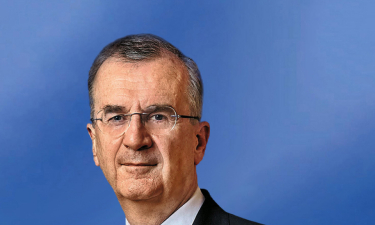- Home
- Governor's speeches
- Interview Frankfurter Allgemeine Zeitung...
Interview Frankfurter Allgemeine Zeitung 26/03/2025

François Villeroy de Galhau, Governor of the Banque de France
Published on the 26th of March 2025

Interview with the Bank's Governor, François Villeroy de Galhau, in the Frankfurter Allgemeine Zeitung of March 26, 2025.
Governor, the EU wants to raise 800 billion euros for defense, and Germany is unpacking the bazooka. How do you assess these spending programs?
The German program is a historical game changer for Germany and for Europe. Germany has had budgetary leeway for some time, and for an economy that is weakening, now is the right time to take advantage of this leeway. However, in order for the program to be a complete success, the supply, the capacity to produce, must increase as much as the funding. This also applies to the European armaments program. Only in this way can lasting dependence on America be avoided.
To what extent are these billion-euro programs invigorating Europe's economy?
A substantial multiplier effect can be expected from infrastructure investments, as well as higher medium term potential growth in Germany. Some European construction companies could also benefit from infrastructure investments. It is more difficult to assess for defense expenditure. These do not increase potential growth, but are intended to prevent a disaster. This is a bit like climate protection spending. However, there can be positive spillover effects on research and development, as the US showed with the internet and other technologies.
Does this expansionary fiscal policy fuel inflation?
No, not necessarily, as domestic demand remains weak in Europe, and if it is accompanied by the expansion of industrial supply. This applies to both the defense and infrastructure sectors.
So your assessment of the inflationary impact of the planned spending programs remains unchanged?
We live in an extremely uncertain world and have to keep a holistic view on all elements. These include US policy, protectionism, but also financial conditions including exchange rates and long term interest rates. There is a solid trend towards disinflation in Europe. The latest inflation rate of 2.3 % is approaching our inflation target of 2%. In France, inflation is even exceptionally well below 2 percent at 0.9 percent, due among others to strong nominal wage moderation. It is perhaps not emphasized enough that, due to its successful policy against inflation, the ECB was able to cut rates earlier and lower, at 2.5 %, than the central banks in the UK and the US.
Does that speak for or against monetary easing in the coming months?
The easing cycle is neither finished nor automatic. As tariffs should not have a significant inflationary effect in the euro area - much less than in the US - I believe there is still scope for further easing. However, the pace and extent remain open. This is what I call agile pragmatism: making monetary policy decisions based on the data - actual as well as forecasted - and not hesitating to act in an agile manner. Seen from today, markets expect an ECB interest rate of around two percent in the summer. It is a possible scenario, considering that summer in Europe lasts from June till September…
Has monetary policy become more difficult as global politics change constantly?
For sure, the environment has become more uncertain and, due to Mr. Trump, even unpredictable. In the midst of this uncertainty, however, monetary policy is a source of stability. What we can guarantee to European citizens, companies and financial players is price stability and financial stability. Our role is obviously not to finance Member States, nor military spending. But if we ensure an inflation rate of around two percent, it inspires confidence and reduces the risk premium in interest rates. Basically, this is the best thing we have inherited from the Bundesbank.
Long term interest rates have already risen in recent weeks, making it more expensive to finance government debt. Does this create new stability risks?
Many countries in Europe already had to be careful about the level of their government debt, regardless of the level of interest rates. That said, the recent rise is mainly due to the German announcement. All other things being equal, this rise in long term yields means a tightening of financial conditions, which we have to incorporate in our monetary assessment.
What is the point of budget rules such as the European Stability and Growth Pact, which has been disregarded for years anyway?
I am a strong supporter of the Stability and Growth Pact. Let us implement it! It is then not necessary to add national budget rules to it. You have however to maintain a certain degree of judgment and adaptability to extraordinary circumstances.
But at what point does national debt become dangerous? Countries like France have long since moved away from the 60 % of economic output envisaged in the Stability and Growth Pact.
Almost all European countries are above that level. This also applies to the United Kingdom and even more so to the USA, whose deficit is far higher than those of any European country. Objectively speaking, all economists agree that the initial 60% threshold is a useful benchmark, but debt sustainability has to be assessed mainly by its trend, on the basis of the primary balance and the gap between the cost of debt and nominal GDP growth. If you want to reduce the debt to GDP ratio, you need a primary surplus, that is, higher revenues than non-interest expenditures. This is what I strongly recommend in France.
How could and should Europe, in addition to the hundreds of billions in additional spending, boost its declining potential growth?
We must not forget the reports by Enrico Letta and Mario Draghi. Europe's response to the Trump shock cannot only be a military-diplomatic one, but also an economic mobilization. Draghi's structural recommendations for increasing competitiveness have no fiscal costs, but they can really increase Europe's potential growth. According to IMF calculations, European economic productivity could be increased by seven percent if internal obstacles in the single market were reduced by ten percent, particularly in services. In addition, the misallocation of abundant European savings - too much debt, not enough equity - must be fixed. And this domestic pool of savings should flow more into the European economy and less outside. Furthermore, we have to reduce the bureaucratic burden. The accumulation of standards is no longer sustainable for companies and citizens. This would allow us to innovate much faster.
However, the deepening of the European single market for capital has been stuck at the project stage for a very long time.
Yes, but I believe that things are changing politically in favour of this « Savings and Investments Union ». I welcome the European Commission's new action plan of last week: 21 actions, which is still a long list, but with some priorities like venture capital or centralised supervision. But if we stick with the traditional bureaucratic reservations, seeking to defend the full old scope of national market supervisory authorities, or saying that one should not invest in innovative products such as venture capital, we will not succeed.
This is the moment for Europe to wake up and strengthen our financial sovereignty. The future German Chancellor has said this very clearly. And I can share that I have never felt such a sense of European purpose as at the last ECB Governing Council meeting at the beginning of March.
Is there any sign that Europe is benefiting from Trump alienating investors?
Unfortunately it has to be said very bluntly: no one is benefiting, neither in Europe nor in Asia. The tragedy of Trump's economic policy is that it turns a positive-sum game, which an open world economy represents, into a game where everyone loses. This applies first and foremost to the United States itself. In its latest forecast, the Federal Reserve has significantly reduced the prospects for growth and increased them for inflation. Everyone expected America's stock prices to rise under Trump, but they have so far fallen.
The ECB is pushing ahead with the introduction of a digital euro. Is it really necessary?
Everybody agrees that the currency needs to become more digital, to meet the expectations of our fellow citizens. But as early as January 20, the new American administration issued an executive order privileging US cryptos: do we want the future of our digital money to be in the hands of private and non-European crypto issuers, when we are talking about Europe's strategic autonomy? It would be completely incoherent to strive for more military or economic autonomy for Europe, but not in key areas of currency and payments. In payments, we are already heavily dependent on a few large non-European card schemes. We must maintain a public and European monetary anchor, and develop payments in close partnership with European commercial banks.
What do you think of the idea of creating a strategic Bitcoin reserve, like Trump?
Bitcoin is not a currency. Nobody is responsible for its value and its price has fluctuated greatly in the past. Bitcoin can be an investment for certain private investors who are willing to take risks. However, sovereign currency reserves are the citizens' money, which we have to invest with wisdom, and not speculatively. We’ll stick to this wisdom.
Do you not expect any positive effects from the planned deregulation in the US, including in the crypto industry?
Regulation of cryptos obviously makes sense, if only to prevent money laundering on the dark web or in illegal transactions, and to ensure investor protection. In Europe we have created this framework with MiCA. Conversely, the deregulation in the US could sow the seeds for a next financial crisis, with consequences for the global economy. We can only regret that the US is not implementing the Basel III banking regulation and is disregarding the recommendations of the Financial Stability Board: beyond the banks, there is the problem of non-banks and some speculative funds. The American-style deregulation, which even calls into question the goal of financial stability and climate change, is a denial of reality. Nevertheless, there is room for simplification in Europe, as we wrote it to the Commission with my friend Bundesbank President Joachim Nagel and our Italian and Spanish colleagues. Simplification, yes; deregulation, no.
Download the full publication
Updated on the 26th of March 2025